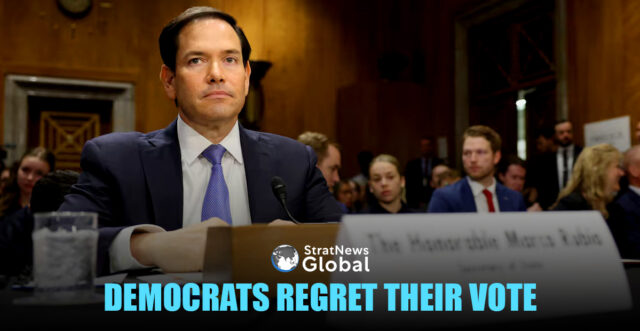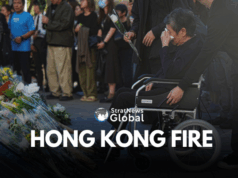US Secretary of State Marco Rubio defended President Donald Trump’s significant cuts to foreign aid and diplomatic spending on Tuesday during his first testimony before Congress as the nation’s top diplomat. Speaking to his former colleagues, some of whom now regret confirming his appointment, Rubio faced criticism for failing to challenge the president’s decisions.
“The State Department had to change. It was no longer at the center of American foreign policy. It has often been replaced by the (White House) National Security Council or by some other agency of government,” he told the Senate Foreign Relations Committee.
The Senate voted 99-0 to confirm the Florida Republican senator as the nation’s highest diplomat on January 20, as Democrats joined Trump’s Republicans in giving the president his first permanent second-term cabinet member just hours after Trump was sworn in.
During a friendly confirmation hearing on January 15, Rubio promised a robust foreign policy focused on US interests, echoing Trump’s “America First” approach to global affairs.
Democrats Regret
Some Democrats who backed Rubio in January have said they regret their votes, as Trump has seized more control of the federal government than any modern president, including cutting funding plans that had been approved by Congress.
Rubio told the Senate committee on Tuesday that the $28.5 billion budget request by the Trump administration for the 2025/2026 fiscal year will allow his department to continue enacting Trump’s vision while cutting $20 billion of “duplicative, wasteful, and ideologically driven programs”.
USAID Questions
At the hearing, Rubio faced tough questions about the decimation of foreign aid – he was an advocate of such aid during his 14 years in the Senate – while slashing staff at the State Department and US Agency for International Development, which used to spend roughly $40 billion a year and is being folded into the State Department.
The administration is proposing a new $2.9 billion America First Opportunity Fund (A1OF) that would take on foreign aid, building on “lessons we learned from USAID,” Rubio said.
“It will allow the Department to respond rapidly to crises, engage proactively with critical partners like India and Jordan, support essential repatriation efforts, and confront strategic threats from near-peer competitors like China,” Rubio said.
Syria Sanctions
Senators also asked Rubio about Trump’s plans to unwind Syria sanctions, Rubio’s role in the administration’s immigration crackdown, the delivery of humanitarian assistance to Palestinians in Gaza and efforts to end the war in Ukraine.
Rubio said the current US assessment is that the Syrian government is precarious, given its wide range of challenges. He said the State Department would allow staff in Turkey, including the ambassador there, to work with local officials in Syria to determine what kind of aid they need.
“It is our assessment that, frankly, the transitional authority, given the challenges they’re facing, is maybe weeks, not many months, away from potential collapse and a full-scale civil war of epic proportions, basically the country splitting up,” he said.
A few protesters interrupted Rubio’s testimony with shouts of “Stop the genocide”, before police bundled them out of the hearing room. Protesters have been regularly interrupting congressional hearings during the war in Gaza.
Senator Jeanne Shaheen of New Hampshire, the committee’s top Democrat, also referred to Trump’s suggestions that Canada could become the 51st US state and that the US could acquire Greenland, which have angered some of Washington’s close allies.
Competition With China
Shaheen said the Trump administration’s policies had made it more difficult to compete with China, noting that Beijing is increasing its spending on diplomacy and providing humanitarian aid in areas where the US abruptly terminated programs.
“Beijing is making the case that they are a more reliable, supportive partner than the United States,” Shaheen said.
Rubio, long known as a China hawk, told the committee that his State Department is confronting “China’s nefarious influence” globally.
“The era of indulging the Chinese Communist Party as it abuses trade practices to steal our technology and floods our nation with fentanyl is over,” Rubio said.
Opinions Divided
A few Democratic senators, including foreign relations committee members Chris Murphy of Connecticut and Chris Van Hollen of Maryland, have said publicly their votes to confirm Rubio were a mistake.
Republicans have praised Rubio, who has become a crucial figure in the Trump administration. He currently is also serving as Trump’s acting national security adviser, the USAID administrator, and the acting archivist of the United States.
Rubio is the first person since Henry Kissinger in the 1970s to hold the secretary of state and national security adviser positions simultaneously.
“When I have a problem, I call up Marco. He gets it solved,” Trump said earlier this month.
Rubio acknowledged his many roles to the committee, joking that he was pleased to be appearing on behalf of the National Archives.
After his testimony to the Senate Foreign Relations Committee, Rubio was scheduled to speak to the Senate Appropriations Committee’s State and Foreign Operations subcommittee at 2 p.m. EDT (1800 GMT).
On Wednesday, he is due to testify before the House of Representatives Foreign Affairs Committee at 10 a.m. EDT (1400 GMT) and the House Appropriations Committee’s State, Foreign Operations and Related Programs subcommittee at 2 p.m. EDT.
(With inputs from Reuters)





